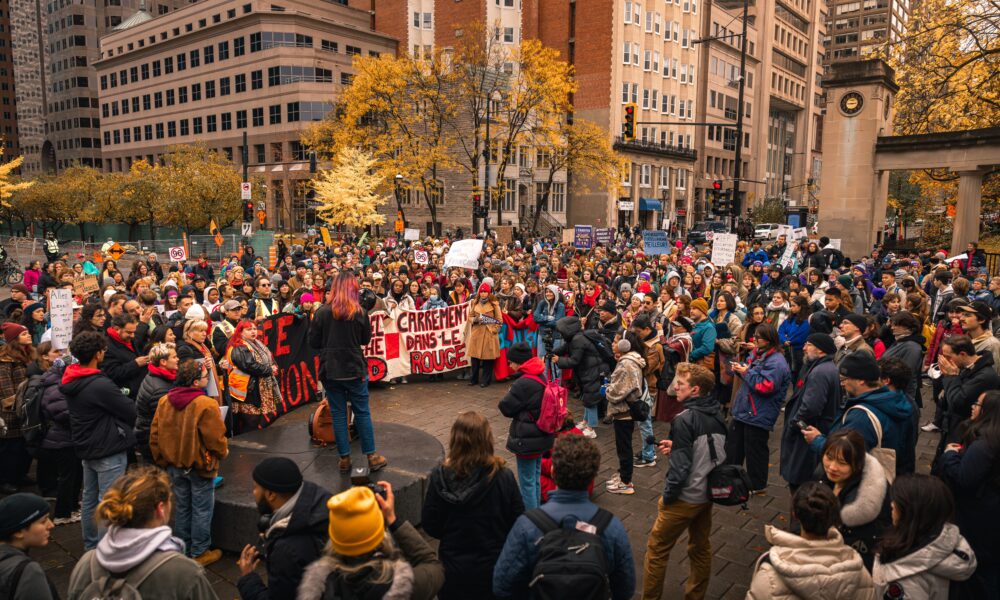Students and faculty from McGill, Concordia, and Bishop’s University protested against the Quebec government’s proposed tuition increases for out-of-province and international students attending anglophone universities on Oct. 30.
Quebec Minister of Higher Education Pascale Déry announced the tuition hike on Oct. 13. Quebec will double tuition fees from about $9,000 to approximately $17,000 a year for out-of-province students starting their undergraduate degrees in the fall of 2024. The tuition rate for international students will also increase to a minimum of $20,000 annually. The Coalition Avenir Québec (CAQ) government says that it made the decision to protect the French language and will use the additional revenue from the tuition hike to fund French-language universities.
The protest began at 1:30 p.m. at Dorchester Square, where a crowd of mostly Bishop’s students had gathered—sporting their school’s purple. Ellis Mari Bambela, U1 Arts, was one of the few McGill students present at the start of the protest.
“For any sane person, what’s going on right now is completely outrageous because people come here for an opportunity to better their education, but it will become impossible for many, many people to study in Quebec, in Montreal,” Bambela told The Tribune.
Quebec’s three English-language universities have voiced similar concerns. Bishop’s University told CityNews that the hike will jeopardize the university’s survival given that one-third of its students come from outside Quebec. Concordia warned that it could lose up to 90 per cent of its out-of-province population. McGill announced on Nov. 3 that the tuition hikes could result in $94 million in revenue losses and up to 700 job cuts across the board, sharing that it might devastate its Schulich School of Music, among other programs.
Around 2 p.m., protestors marched down boulevard De Maisonneuve toward Concordia’s downtown campus before turning on Sherbrooke Street towards McGill’s Roddick Gates. The chant “Education is a right, not just for the rich and white” echoed through the streets. Many of those who attended the protest had pinned a red square to their clothes, a symbol of Quebec’s 2012 student strikes, also known as the Maple Spring. The march ended in front of Premier Francois Legault’s office, where organizers and speakers gathered by McGill’s Roddick Gates for speeches. Three English professors from Concordia addressed the crowd, criticizing the proposed increases and Legault’s CAQ government in general.
“This is not a measure that really has to do with language [….] This is a measure that has first of all to do with incompetence and corruption. We’re talking about the same government that at the beginning of the pandemic let elderly people die in nursing homes,” Professor Nathan Brown said in his speech. “Of course, the government is attempting to divide us along lines of language, but I would say also that this divides the community in Montreal along lines of race, religion, and class, and we can’t allow that to happen.”
Kennedy McDiarmid, an out-of-province U2 Arts student from British Columbia, also spoke at the protest. She condemned the tuition hikes for “making education only accessible to the wealthy and privileged few” and criticized the Quebec government’s student mobility agreements that exempt French and Belgian students from international tuition rates.
“Legault wants to protect French, so I have some suggestions to help them figure that out. […] You know the tuition that students from France and Francophone Belgians pay? Make that accessible to students from all French-speaking countries,” McDiarmid cried to a raucous crowd.
The Oct. 30 protest was dubbed “Blue Fall” by the organizers, U2 Arts student Alex O’Neill and Concordia student Noah Sparrow. In an interview with The Tribune, O’Neill explained the name’s symbolic meaning: “Blue” represents the CAQ’s official colours, while “Fall” represents the season and is meant to pay tribute to the 2012 Maple Spring protests.
“If you read it backwards, fall of the blue, it [symbolizes] the CAQ government. Something that, obviously, has kind of fueled this [is the] government’s inability to consult with the universities, with the student body on not only this issue but, a lot of issues over the last five years,” O’Neill said.
This piece was updated at 9:45 on Nov. 13.










